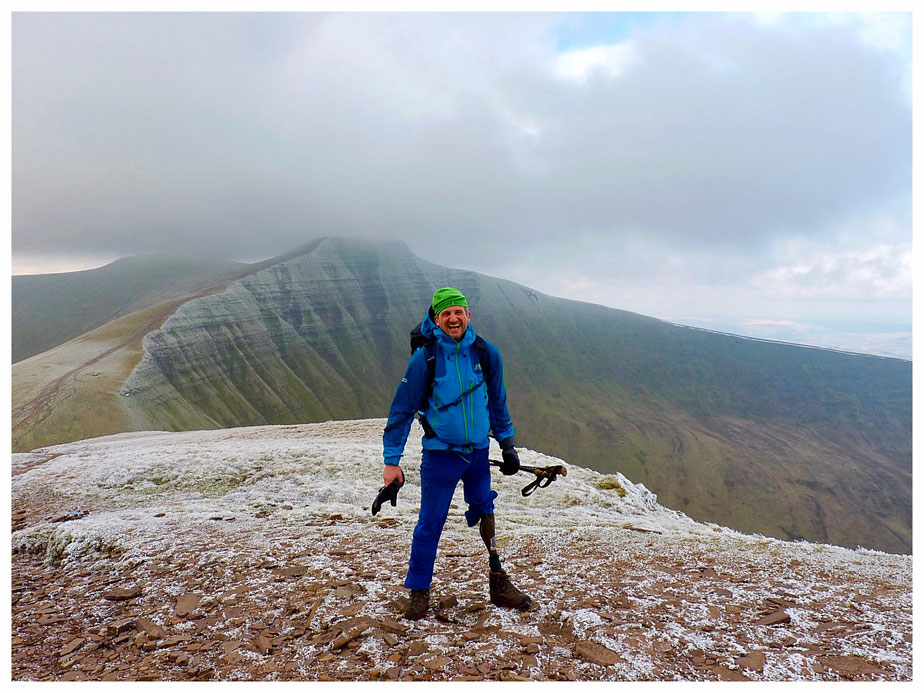A Journey That Begins With A Tragedy
My own journey really began on February 24, 2001, on the icy slopes of Ben Nevis in Scotland.
I luckily survived a winter mountaineering fall from a beautiful, exposed 600 metre-long route called Tower Ridge, which tragically killed my climbing partner, Neil, leaving me to freeze
overnight with significantly disabling, and life-long, injuries. The physical injuries were, over time, recognized for what they are, adapted towards, decisions made on a way forward based on an
awareness of these imposed limitations (and opportunities for growth). That's when my journey began.
I Needed To Move Beyond My Fears And Memories
We fell over 650 ft, where I sustained life-threatening injuries to my head and both legs. As a result of the fall and overnight stay in temperatures excelling -10 degrees Celsius, c.75% of my fingers were removed due to 3rd degree frostbite, while the injuries to the legs required a below-knee amputation of the right leg, and resetting of the dislocated and broken left ankle. I spent 13 days in ICU, the first 7-8 days being 50-50 on my survival. 3.5 months later in mid-June I walked out of the hospital, and on a new path. Learning how to walk, to use my hands again (I lost all the fingers and most the thumb of my preferred right hand, and over half those on the left). Learning how to write (and use chopsticks!) again was one of many humbling, testing, and illuminating goals I explored.
The psychological journey was no less challenging, as I learned that exploring the ‘basement’
of my own consciousness helped me understand and move beyond the fears and memories of that day in February 2001.
Recovery And Renewal On The Psychological Journey
Having survived and thrived after my life-threatening winter mountaineering fall, I have a first-hand understanding of the psychological journey all amputees experience. Through identifying what I could change about myself and my circumstances, and accepting those I could not, I came to discover renewed purpose and meaning in life.
My own journey of recovery, together with my Psychosynthesis Life Coaching and Hypnotherapy training, enables me to offer a unique suite of recovery
services. Methods that can be of immense benefit for people who have to come to terms with dramatic changes in their lives and face immense challenges.
Life Coaching
My approach to life coaching, i.e. discovering a renewed path of purpose and meaning after trauma, provides a friendly, safe space for coming to terms with life-changing trauma, while confronting
fears and problems. Psychosynthesis as a depth psychology, i.e. recognising the reality of the unconscious in our lives, provides the tools and principles for:
- Exploring new directions and opportunities in career and vocation, i.e. a sense of identity, purpose and meaning
- Addressing stress and motivation after a traumatic event
- Managing the ‘Inner life’ as part of the psychological journey, including body image and openness to alternative social activities
- Helping with goal setting and planning for the future.
Hypnotherapy
Hypnosis is a surprisingly common and natural state of relaxed awareness and concentration, where the deeper, unconscious layers and parts of the mind are accessed. This enables positive,
empowering suggestions to be made, in service of the goal of recovery. Hypnotherapy is a scientifically well-researched and proven approach for effective treatment of:
- Anxiety following amputation surgery
- Working with phantom limb pain
- Ongoing pain management
- Working with trauma
- Resolving irrational fears and undesirable feelings
- Developing a new self-image, our sense of “I am…”.
Neuro Linguistic Programming
Neuro Linguistic Programming (NLP) had its origins in the early-to-mid 1970s ‘self-help’
movement in the United States of America, and is a practical psychological approach for personal development and change. The techniques are easy-to-learn and apply, and are focused on
future-oriented outcomes, as ways of handling life-changing events and episodes:
- Overcoming phobias
- Effectively managing stress
- Addressing anxiety-related problems
- Freedom from past negative experiences
Mentoring For Fellow Amputees
The area my work tends to take can be quite broad, working with people with a fear of heights, to recovery from
life-threatening accidents. Part of that work also involves being a mentor for fellow amputees who are experiencing difficulties in adjusting to a new life.
Part of my work involves introducing psychological principles and techniques that help clients self-manage their
thoughts, emotions and impulses. One recent client who was in amongst the legal proceedings for compensation - having had a leg amputated beneath the knee from a work-related accident -
experienced difficulties with unwelcome feelings of vulnerability. I’ve been in that place myself. I know that these unpleasant feelings, expressed as physical sensations in the body that go
alongside feelings of helplessness and fear, are anchored in the body’s experience of trauma and pain.
Our bodies keep an unconscious record, and remind us on occasion of where we’ve come from. So teaching this man
guided visualisation techniques, aimed at him being able to recognise, accept and then detach himself from these difficult experiences, helped him to bring himself back into the present moment,
into ‘Now’. He is more than who he was. He is more than the disabilities he has, over time, had to identify with out of necessity,
Aren’t we all more than our disabilities and less-than-desirable character traits? I believe
that we are, each and all.

Guest post by Richard Lamb. Richard is a Hypnotherapist in Nottingham/United Kingdom. He is a a member of the Association for the Advancement of Psychosynthesis, and the National Council for Psychotherapists, and as such aligns with and adhere to its Code of Ethics and Standards. If you want to learn more about him and his work, please visit his website True North Therapy.
